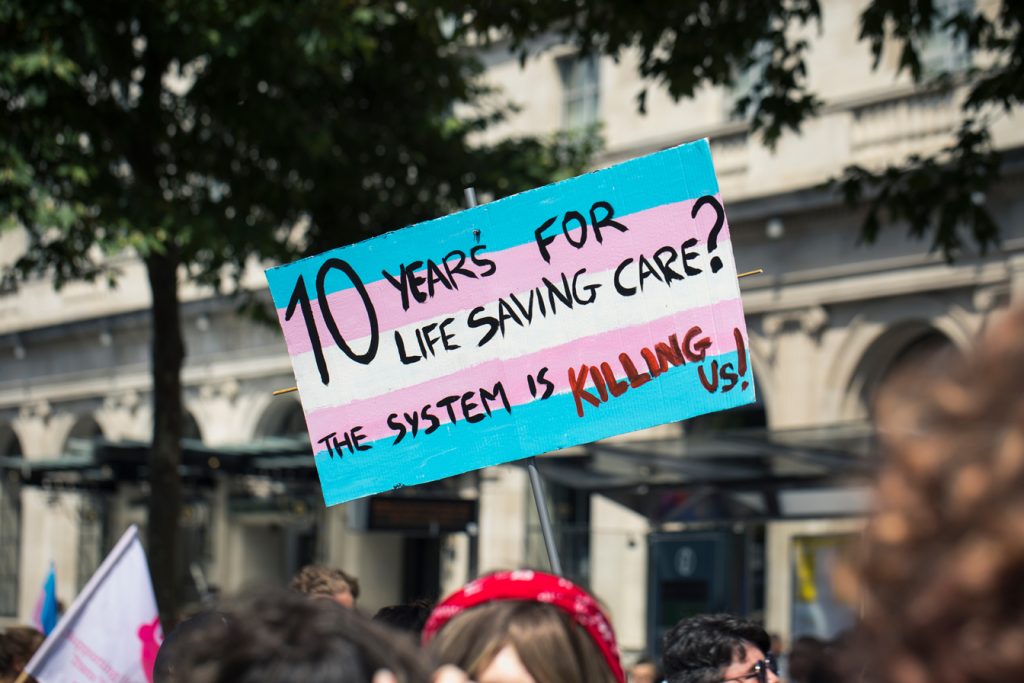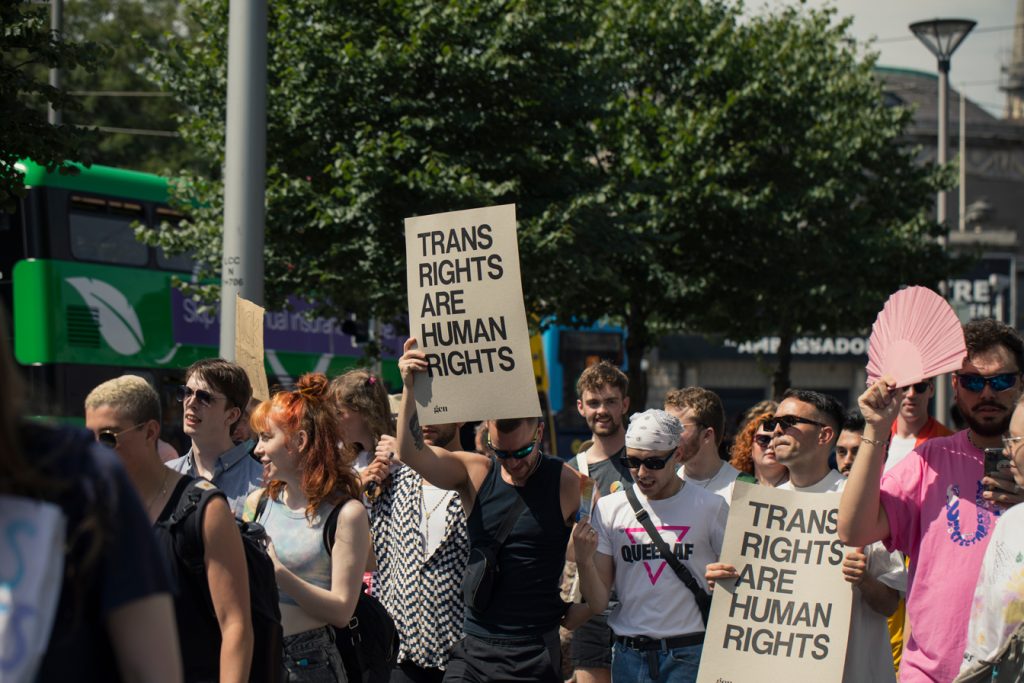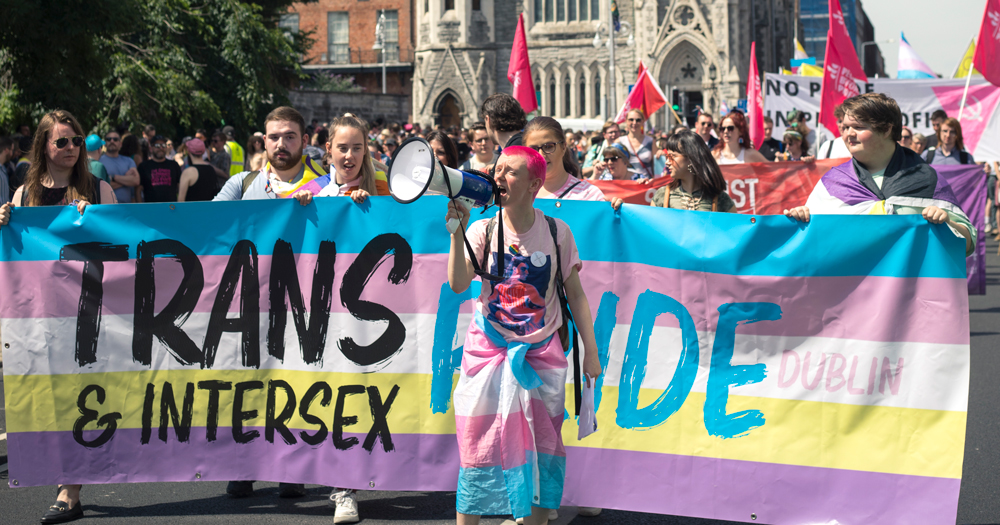Last Saturday, July 16, more than 2000 people joined a march for Trans and Intersex Pride in the streets of Dublin. Protestors took to the streets of the capital to demand better access to healthcare, increased protections for Intersex people and an end to the culture of homophobia and transphobia that is still present in Ireland.
The march kicked off at the Garden of Remembrance, where LGBTQ+ activist Izzy Kamikaze gave a speech in front of a huge crowd, the biggest in the history of Dublin Trans and Intersex Pride yet.
She spoke about “the urgent need to completely ban what is sometimes called ‘conversion therapy’,” but as she described, “should more accurately be called ‘conversion practices’ because there is absolutely nothing therapeutic about working to persuade Trans people or gay people not to be gay or Trans.”
After her speech, the streets of Dublin were painted with the colours of the Trans, non-binary and Intersex flags, until the march ended in Merrion Square, where other speakers took to the stage to advance the core demands of Trans and Intersex Pride.
Access to gender-affirming healthcare for Trans folks was one of the main concerns raised by multiple speakers, who talked about the six-year waiting lists and the intrusive and discriminatory questions that Trans people face when they attempt accessing treatments. The result is that many are forced to travel abroad to access the same healthcare that cisgender people are granted without trouble in Ireland and that some try to find alternatives on the black market and resort to self-medicating.
https://www.facebook.com/gaycommunitynews/videos/755117602492186/
“Currently in Ireland, young trans people under the age of 17 have no way of accessing the healthcare they need through the public health service, whilst those over the age of 17 have one option: face waiting lists of up to ten years to be assessed through unscientific, traumatising and highly sexualised questions at the Loughlinstown clinic,” said the event’s organisers.
Trans activist Lilith Ferreyra-Carroll from TENI spoke about the rising wave of transphobia that we are witnessing in Ireland and the increased presence of anti-trans groups. “Transphobic groups in recent weeks have intensified their ongoing campaigns of misinformation, division and hate, and our media has shamefully played their part in the name of balance, debate, concerns,” Ferreyra-Carroll said.

She also praised the resilience that the Irish Trans community has shown in the face of such abuses. “Trans people of Ireland – the people of Ireland – have responded resoundingly that intolerance will not be tolerated. Trans and non-binary people are our friends and family.” she said.
Olive Wilson, co-founder of Intersex Ireland, also took the stage and talked about the need to implement better protections for Intersex people in Ireland, who remain virtually invisible. “Intersex children and babies are given no legal protection against [IGM]. Intersex parents experience pressure to change their babies’ bodies,” said Wilson “It is a long-term mistake and the implications are fairly awful for that person for the rest of their life.”
https://www.facebook.com/gaycommunitynews/videos/1215952035848190/
“Despite making up almost 2% of births, the fearmongering and misinformation surrounding Intersex people mean they are more than often forced into the rigid boxes of male and female, with countless instances of their medical histories hidden from them or entirely destroyed, resulting in many Intersex people not knowing about their identities until adolescence or adulthood,” the organisers said.
Among the other speakers were Mary McDonagh of the National Action Group for LGBT+ Traveller and Roma Rights, who read a letter written by Mike, a Trans man from the Traveller community who spoke about his lived experience; and Delroy Mpofu from TENI, who gave a voice to Trans people living in direct provision centres.
Multiple speakers called out the platforming of anti-trans voices by national broadcaster RTÉ, which led Dublin Pride to cut ties with them earlier in June. Some people took to social media to point out the lack of appropriate reporting about Dublin Trans and Intersex Pride from the news outlet, which only published a brief article about the event on Saturday.

You can view the full photo album from Trans and Intersex Pride here.
© 2022 GCN (Gay Community News). All rights reserved.
Support GCN
GCN is a free, vital resource for Ireland’s LGBTQ+ community since 1988.
GCN is a trading name of National LGBT Federation CLG, a registered charity - Charity Number: 20034580.
GCN relies on the generous support of the community and allies to sustain the crucial work that we do. Producing GCN is costly, and, in an industry which has been hugely impacted by rising costs, we need your support to help sustain and grow this vital resource.
Supporting GCN for as little as €1.99 per month will help us continue our work as Ireland’s free, independent LGBTQ+ media.
